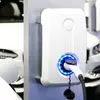Union Budget charges up EV sector with key moves towards affordability
The Union Budget proposed a custom duty exemption on 25 critical metals, including nickel, cobalt, and lithium, which will help the EV sector in India.
The Union Budget presented by Finance Minister Nirmala Sitharaman on Tuesday laid out measures to spruce up the EV industry in India by making the raw materials needed for manufacturing lithium-ion batteries cheaper.
India will exempt customs duty on 25 critical metals that previously had tax rates ranging from 2.5% to 10% and cut basic customs duty on two minerals—ferro nickel and blister copper.
Lithium battery manufacturing uses nickel, cobalt, and lithium. However, India does not mine any of these minerals, forcing companies to import them for battery production.
A tax cut would help these companies procure the raw materials at a lower price, making batteries more affordable and an attractive alternative to Indian consumers.
“The removal of customs duties on critical rare earth metals like lithium, nickel, and cobalt is a pivotal step in reducing battery manufacturing costs in India,” Aayush Goyal, MD & CEO of RCRS Innovations Limited (RCRSIL), told YourStory.
“The Union Budget proposed to fully exempt customs duties on 25 critical minerals and reduce BCD on two of them, which will make Battery Energy Storage Systems (BESS) and Electric Vehicles (EVs) more accessible and affordable. With lower raw material costs, manufacturers will be able to enhance efficiency and foster innovation,” Goyal added.
The Indian EV market is expected to grow at a compound annual growth rate (CAGR) of 49% from 2022 to 2030, according to think tank NITI Aayog. The government has put in place a target of achieving 30% EV market share by 2030, as part of the country’s measure to achieve net zero vision by 2070.
However, customers are cautious about the high upfront costs for EVs compared to their gasoline counterparts, which are partly propelled by the high price tags of EV batteries.
“Batteries make for around 30-40% of the cost of an EV so as per estimates, this exemption on custom duties could bring down battery cost by 25%. This will have a ripple effect and ultimately make EVs more affordable for the consumer,” Samrath Singh Kochar, Founder and CEO of Trontek, told YourStory.
Kochar added that reducing the financial burden on battery manufacturers can help accelerate the transition to cleaner energy solutions, benefiting end consumers with more affordable and efficient EV options.
The Budget laid out plans to set up a Critical Mineral Mission to promote domestic production, recycling, and overseas acquisition of critical mineral assets.
“Facilitating overseas acquisitions of critical mineral assets and upcoming offshore mineral auction rounds may further bolster India’s position in the global supply chain and contribute to its self-sustainability,” said Bhuvneshwar Pal Singh, Chief Financial Officer of Maxvol Energy, told YourStory.
Additionally, Singh said the withdrawal of the 2% equalization levy on e-transactions is anticipated to drive growth in the automobile sector and significantly impact India’s EV market by reducing production costs and enhancing competitiveness.
The government has also introduced many schemes and policies to provide subsidies for EVs, including FAME II, none of which saw any mention in the latest Union Budget. This includes the anticipated rolling out of a new phase of FAME, which YourStory had previously reported to have a budget outlay of Rs 10,000 crore, similar to FAME II.
Edited by Jyoti Narayan









